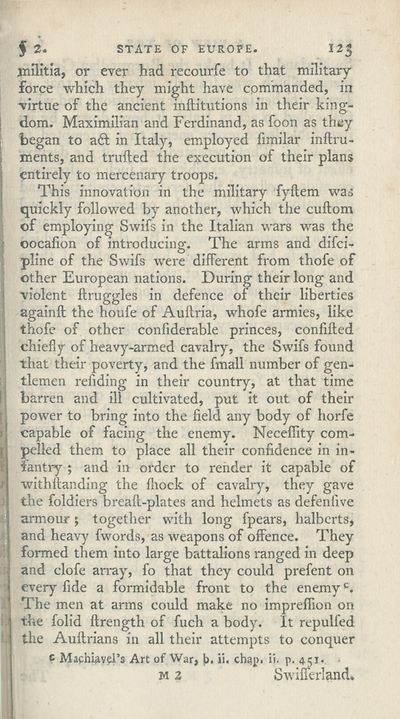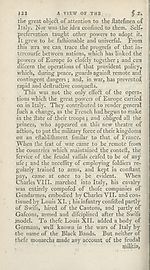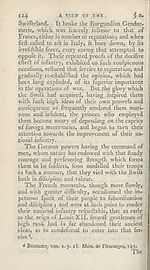Download files
Complete book:
Individual page:
Thumbnail gallery: Grid view | List view

:
$ 2. STATE OF EUROPE. I2J
militia, or ever had recourfe to that military-
force which they might have commanded, in
virtue of the ancient inftitutions in their king¬
dom. Maximilian and Ferdinand, as foon as they
began to aft in Italy, employed fimilar inftru-
ments, and trufted the execution of their plans
entirely to mercenary troops.
This innovation in the military fyftem was
quickly followed by another, which the cuftom
of employing Swifs in the Italian wars was the
oocafion of introducing. The arms and difei-
pline of the Swifs were different from thofe of
other European nations. During their long and
violent ftruggles in defence of their liberties
againft the houfe of Auftria, whofe armies, like
thofe of other confiderable princes, confifted
chiefly of heavy-armed cavalry, the Swifs found
that their poverty, and the fmall number of gen¬
tlemen refiding in their country, at that time
barren and ill cultivated, put it out of their
power to bring into the field any body of horfe
capable of facing the enemy. Neceffity com¬
pelled them to place all their confidence in in¬
fantry ; and in order to render it capable of
withftanding the flnock of cavalry, they gave
the foldiers breaft-plates and helmets as defenfive
armour ; together with long fpears, halberts,
and heavy fwords, as weapons of offence. They
formed them into large battalions ranged in deep
and clofe array, fo that they could prefent on
every fide a formidable front to the enemyc.
The men at arms could make no impreflion on
the folid ftrength of fuch a body. It repulfed
the Auftrians in all their attempts to conquer
£ Machiavel’s Art of War, b. ii. ch^p. ii. p. 451.
m 2 Swifferland.
$ 2. STATE OF EUROPE. I2J
militia, or ever had recourfe to that military-
force which they might have commanded, in
virtue of the ancient inftitutions in their king¬
dom. Maximilian and Ferdinand, as foon as they
began to aft in Italy, employed fimilar inftru-
ments, and trufted the execution of their plans
entirely to mercenary troops.
This innovation in the military fyftem was
quickly followed by another, which the cuftom
of employing Swifs in the Italian wars was the
oocafion of introducing. The arms and difei-
pline of the Swifs were different from thofe of
other European nations. During their long and
violent ftruggles in defence of their liberties
againft the houfe of Auftria, whofe armies, like
thofe of other confiderable princes, confifted
chiefly of heavy-armed cavalry, the Swifs found
that their poverty, and the fmall number of gen¬
tlemen refiding in their country, at that time
barren and ill cultivated, put it out of their
power to bring into the field any body of horfe
capable of facing the enemy. Neceffity com¬
pelled them to place all their confidence in in¬
fantry ; and in order to render it capable of
withftanding the flnock of cavalry, they gave
the foldiers breaft-plates and helmets as defenfive
armour ; together with long fpears, halberts,
and heavy fwords, as weapons of offence. They
formed them into large battalions ranged in deep
and clofe array, fo that they could prefent on
every fide a formidable front to the enemyc.
The men at arms could make no impreflion on
the folid ftrength of fuch a body. It repulfed
the Auftrians in all their attempts to conquer
£ Machiavel’s Art of War, b. ii. ch^p. ii. p. 451.
m 2 Swifferland.
Set display mode to:
![]() Universal Viewer |
Universal Viewer | ![]() Mirador |
Large image | Transcription
Mirador |
Large image | Transcription
| Antiquarian books of Scotland > Kings & rulers > History of the reign of the Emperor Charles V. > Volume 1 > (141) |
|---|
| Permanent URL | https://digital.nls.uk/109184023 |
|---|
| Description | By William Robertson. London : Cadell and Davies, 1798. |
|---|---|
| Shelfmark | ABS.1.76.13 |
| Additional NLS resources: | |
| Description | Thousands of printed books from the Antiquarian Books of Scotland collection which dates from 1641 to the 1980s. The collection consists of 14,800 books which were published in Scotland or have a Scottish connection, e.g. through the author, printer or owner. Subjects covered include sport, education, diseases, adventure, occupations, Jacobites, politics and religion. Among the 29 languages represented are English, Gaelic, Italian, French, Russian and Swedish. |
|---|

